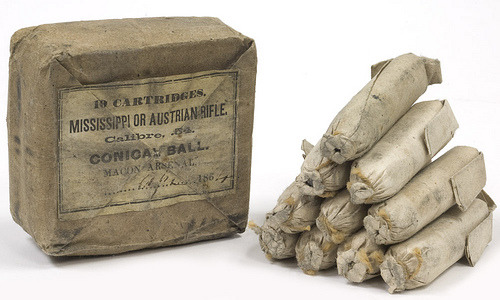The Sepoy Rebellion and the Beef Fat Bullets,By the 1850’s the British East India Company had
The Sepoy Rebellion and the Beef Fat Bullets,By the 1850’s the British East India Company had a huge private army of 300,000 men. The East India Company was a British Company that was given a near monopoly over trade in Asia and other colonies. As a result, the company hired its own private land and naval force, which was often better trained, organized, and equipped than the regular British Army. However, out of the 300,000 company soldiers, only 50,000 of them were British. The rest were native soldiers traditionally called “sepoys” by the British.After decades of poor treatment by their British masters, the Sepoys were definitely on edge. All it would take is one small spark to trigger a massive nationwide rebellion. On the 10th of May, 1857, the Sepoy troops were issued the new 1853 pattern percussion lock rifled muskets. A muzzleloading rifle, the user would bite open a paper cartridge and then poor the paper wad and bullet into the barrel. There was one problem, however, the cartridges were greased with tallow, a fat made from beef or pork. This was extremely offensive to the Sepoy troops, who would have been Hindu or Muslim. Hindu’s believe the cow to be a sacred animal while Muslims believe consumption of pork to be forbidden. The Sepoy’s were ticked.The British, initially ignorant of indigenous culture, tried to remedy the situation by issuing non greased cartridges, but by then it was too late. Sepoy troops believed that the greased cartridges were an attempt by the British to destroy the Indian way of life. Animosity turned to open rebellion as Sepoy troops slayed their British officers. Sepoy civilians revolted against the British, driving out tax collectors and other officials from their towns and cities. Eventually the whole of India was in open rebellion against the British Empire, and a new Indian Emperor, Bahadur Shah Zafar, was proclaimed.The war would last over a year with thousands dead on both sides. Worst of all, brutal atrocities were committed by both sides, as rebels had the habit of raping and pillaging towns and cities they captured, and the British enacted a no prisoners policy. When the war ended there was no amnesty for the rebels, and most were executed by hanging, beheading, or being tied to cannon and blown to pieces. -- source link
Tumblr Blog : peashooter85.tumblr.com
#history#bullets#india#indian history#british history#sepoys#hinduism#culture#religion


